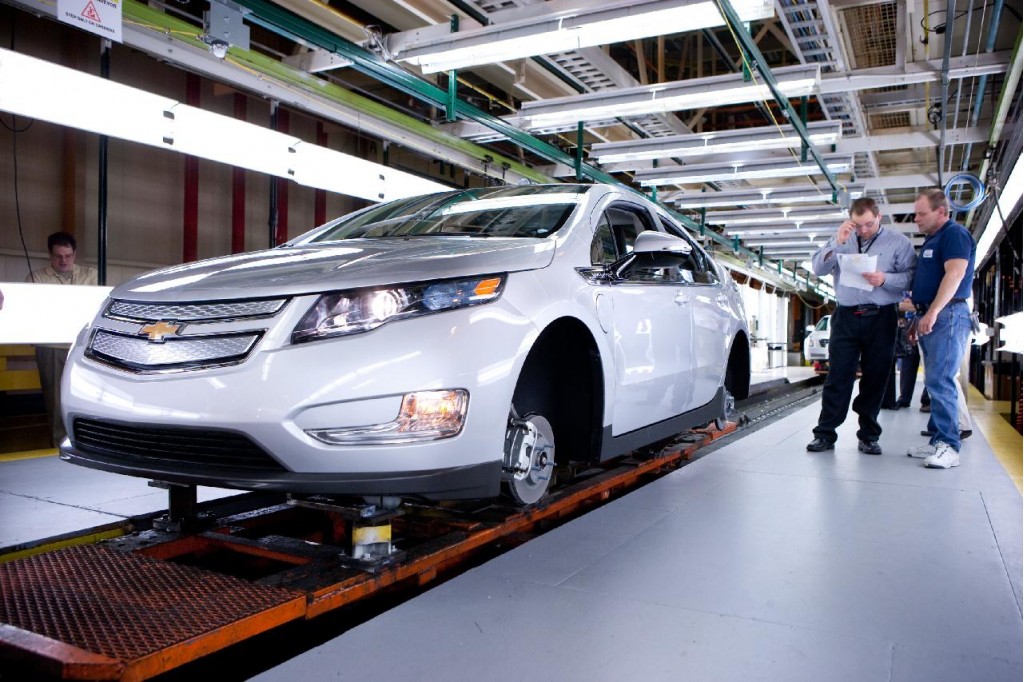It's been the official policy of the Chinese government-industrial complex for a while now that the country wants to dominate the electric-car business.
While only a handful of highway-capable plug-in cars are sold today in China, the country's industrial overseers are nothing if not ambitious.
Enter General Motors, which will put its Chevrolet Volt range-extended electric car on sale in China toward the end of the year.
The 2012 Chevrolet Volt will be the very first electric or plug-in vehicle built outside China to be sold in noticeable numbers in the country.
Hand it over, buddy
But there's a catch: China requires GM to hand over the intellectual property behind at least some of the Volt's technology to a Chinese company to qualify for generous incentives.
Last spring, the rules were changed for the country's "New Energy Vehicle Development Plan" to give generous incentives only to high-fuel-efficiency and plug-in cars that are built in China. It covers battery electric cars, plug-in hybrids, and hydrogen fuel-cell vehicles, but not hybrids.

Shanghai GM plant
That's not out of the question; GM already builds more than 1 million cars a year in China, and building the Volt in China was discussed as early as two years ago, well before the first Volt was sold in December 2010.
But here's the worse part: To qualify for the incentives, a Chinese-owned firm must own the intellectual property rights and have "mastery" of one of the qualifying vehicle's three key components: the electric motor, battery pack, or power electronics.
Violating WTO rules?
GM, understandably, doesn't want to hand over the family jewels by transferring core electric-drive technology to one of its Chinese partner firms.

First 2011 Chevrolet Volt built on production tooling at Detroit Hamtramck plant, March 31, 2010
Standoff?
Thus far, yes. GM could certainly sell the Volt without transferring its intellectual property, but it would then lose the marketing advantage of subsidies ranging up to $19,200.
Moreover, some trade experts say the Chinese requirement could violate World Trade Organization rules--China is a member of the WTO--by insisting on such a transfer as a condition of receiving subsidies. Officials from both the U.S. and the European Union have already protested the rules numerous times, according to reports.
Which hasn't stopped the officials to date, either in automobiles or other industries--water purification, wind turbines, and high-speed trains, to name a few.
Transfer rules: cheaper than R&D
Tech-transfer requirements are a cheap, quick way for Chinese companies to gain first-world know-how. Research and development is expensive and time-consuming, with many dead ends, and the R&D budgets of most companies in China are tiny in proportion to their sales.
And the Chevy Volt is truly a pioneer. Other makers who would like to sell plug-ins manufactured elsewhere--Nissan, BMW, Mercedes-Benz, Volkswagen, and Toyota, among others--are waiting to see how the Volt fracas plays out before making final decisions.

2012 Ford Focus Electric launch, New York City, January 2011 - Nancy Gioia
Ford rolls over
Ford's director of global electrification strategy, Nancy Gioia, said the company will comply with the tech-transfer requirement, according to the Times. But Ford has plans only for a demonstration fleet, and has not announced that it will put its 2012 Ford Focus Electric on sale in China.
GM raises the issue of the unfair rules with Chinese officials "every chance we get," Raymond Bierzynski, the executive director of electrification strategy at G.M. China told The New York Times.
There will clearly be more to come on this story as the date for selling the Chevy Volt in China gets closer.

Traffic in China
Most electrics now 2-wheelers
Very, very few plug-in cars are sold today in China; all but a handful of the electric vehicles are actually two-wheeled electric bicycles and mopeds.
Industry experts have debated whether China's auto-electrification plan is too aggressive. It is now refocusing toward hybrid-electric vehicles and others that can reduce overall fuel consumption.
But some analysts say the Chinese government is backing away further from electric vehicles, at least for the moment.
+++++++++++













